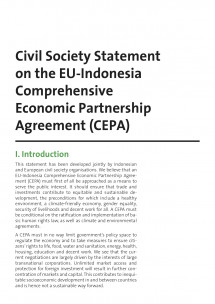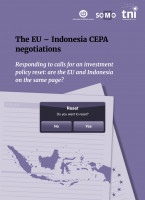An agreement should ensure that trade and investments contribute to equitable and sustainable development, the preconditions for which include a healthy environment, a climate-friendly economy, gender equality, security of livelihoods and decent work for all. A CEPA must be conditional on the ratification and implementation of basic human rights law, as well as climate and environmental agreements.
A CEPA must in no way limit government’s policy space to regulate the economy and to take measures to ensure citizens’ rights to life, food, water and sanitation, energy, health, housing, education and decent work. We see that the current negotiations are largely driven by the interests of large transnational corporations. Unlimited market access and protection for foreign investment will result in further concentration of markets and capital. This contributes to inequitable socioeconomic development in and between countries and is hence not a sustainable way forward.




